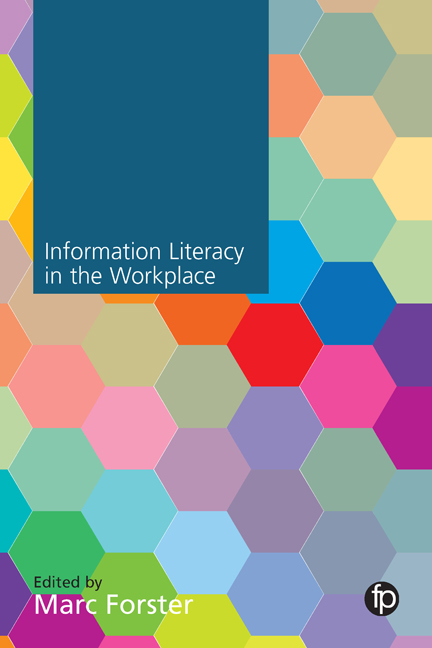Book contents
- Frontmatter
- Contents
- Figures and tables
- Contributors
- Foreword
- 1 Information Literacy and the workplace: new concepts, new perspectives?
- 2 How is Information Literacy experienced in the workplace?
- 3 Information Literacy and the personal dimension: team players, empowered clients and career development
- 4 From transaction to transformation: organizational learning and knowledge creation experience within Informed Systems
- 5 Virtuality at work: an enabler of professional Information Literacy
- 6 Determining the value of Information Literacy for employers
- 7 Information Literacy's role in workplace competence, ‘best practice’ and the ethics of professional obligation
- 8 Learning within for beyond: exploring a workplace Information Literacy design
- 9 Developing information professional competences in disciplinary domains: a challenge for higher education
- 10 The ‘hidden’ value of Information Literacy in the workplace context: how to unlock and create value
- 11 The ‘Workplace Experience Framework’ and evidence-based Information Literacy education
- References
- Index
5 - Virtuality at work: an enabler of professional Information Literacy
Published online by Cambridge University Press: 08 June 2018
- Frontmatter
- Contents
- Figures and tables
- Contributors
- Foreword
- 1 Information Literacy and the workplace: new concepts, new perspectives?
- 2 How is Information Literacy experienced in the workplace?
- 3 Information Literacy and the personal dimension: team players, empowered clients and career development
- 4 From transaction to transformation: organizational learning and knowledge creation experience within Informed Systems
- 5 Virtuality at work: an enabler of professional Information Literacy
- 6 Determining the value of Information Literacy for employers
- 7 Information Literacy's role in workplace competence, ‘best practice’ and the ethics of professional obligation
- 8 Learning within for beyond: exploring a workplace Information Literacy design
- 9 Developing information professional competences in disciplinary domains: a challenge for higher education
- 10 The ‘hidden’ value of Information Literacy in the workplace context: how to unlock and create value
- 11 The ‘Workplace Experience Framework’ and evidence-based Information Literacy education
- References
- Index
Summary
This chapter will discuss:
• how ‘Virtuality’ is that dimension of professional activity that transcends the workplace, through engagement with internet-wide communities of professional communication and practice.
• how in professions in which Virtuality is an essential component, Information Literacy (IL) can be experienced beyond workplace boundaries and in more complex ways.
Introduction
Information Literacy has been investigated in a number of professional groups in the workplace. Lawyers (Macoustra, 2004), administrative staff and academics in higher education (Bruce, 1997), senior managers (Kirk, 2004), firefighters (Lloyd, 2005), business professionals (Freudenberg, 2008), ambulance officers (Lloyd, 2009), tele-health officers (O'Farrill, 2010), web designers and developers (Sayyad Abdi, 2014; Sayyad Abdi, Partridge and Bruce, 2016) and nurses (Forster, 2015a) are examples of groups that have been investigated in terms of their experience of the phenomenon of ILin their varying working circumstances and conditions.
It has been argued that due to variations in environment and conditions, the experience of IL might be significantly different in each workplace (Lloyd and Williamson, 2008; Weiner, 2011). But is IL in fact contained and defined by the workplace? A recent study into IL experiences of web designers and developers (‘web professionals’ hereafter) suggested that we may be able to distinguish experienced IL in the workplace at two levels: as a workplace community and at a virtually connected, wider, professional level (Sayyad Abdi and Bruce, 2015). IL at a professional level does not reflect necessarily the boundaries and essence of physical workspaces. People at professional level have expanded interactions which include their whole professional community of practice. This broader field of performance gives them the opportunity to encounter and recognize a wider range of information experiences than are available in and fixed by specific workplace organizational cultures. This wider information environment, using a relational approach (Bruce, 1997), can be interpreted as a more complex experience of IL. From a relational perspective, IL is about being able to use information effectively in a range of different ways in differing contexts. The ability to experience information in more varied ways, especially at those higher levels of functionality in the professional sphere, is to have a more complex experience of IL. Experiencing IL at a professional level may contribute to its enhancement.
- Type
- Chapter
- Information
- Information Literacy in the Workplace , pp. 57 - 66Publisher: FacetPrint publication year: 2017
- 2
- Cited by

